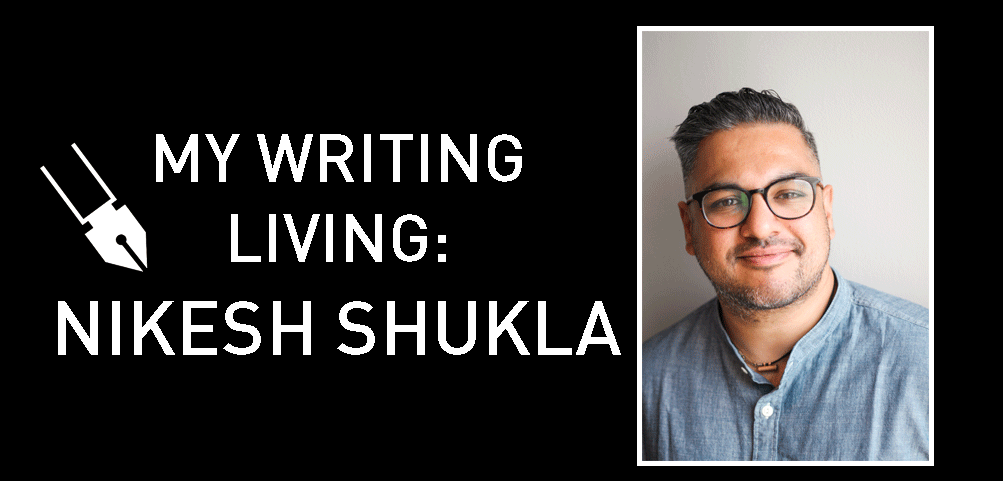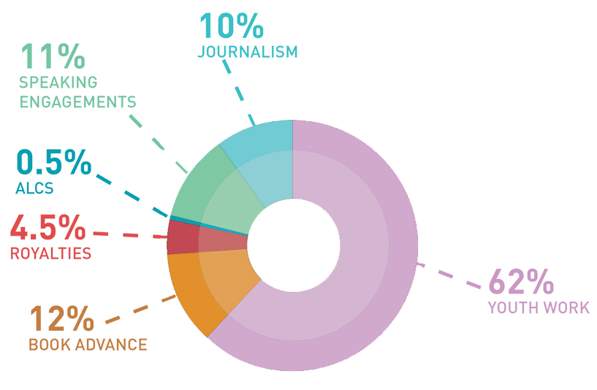
My Writing Living: Nikesh Shukla
The acclaimed novelist, screenwriter and champion of marginalised voices tells us how his activism, mentoring work, and unstinting efforts to bring about greater diversity in publishing have inspired and informed a writing living of his own.
Whether for The Good Immigrant, the award-winning 2016 anthology he edited in which 21 British writers of colour discuss race and immigration in the UK; or for his columns in the Observer; or for his own writing (his debut YA novel Run Riot has just been nominated for the 2019 CILIP Carnegie Medal), you’ll almost certainly have come across the work of Nikesh Shukla.
Don’t give up the day job, they say. But after four years of combining a full-time role in Bristol with his own writing and activism, Nikesh’s recent hike in profile gave him the courage to go fully freelance early in 2018. Yet the overall picture that emerges from our phone conversation, is not a sudden burst of fame, but success built on long hours and dedicated grass roots work, much of it spent nurturing the talent of others as well as his own.
Originally from Harrow, Middlesex, Nikesh, 38, did a law degree at university, where it was the human rights modules within the course which gave him the passion for activism he has retained ever since. He worked for a number of charities and non-profit organisations including Book Trust before moving to Bristol to work for arts organisation, Watershed. Based at Bristol harbourside, it curates a diverse programme of original ideas, talent development, cinema, events and festivals with a focus on education, skills and understanding of the arts. “It’s a brilliant, brilliant place. When I joined, they had received some funding from the council to mentor young people in a new writing development programme. The brief was to set up a new magazine called Rife in order to develop young writing talent. So I created six-month paid internships through which I mentored lots of writers and filmmakers. Many of them have gone on to do amazing things: one of them is working at The Guardian, another is at BBC Studios making films. Out of the 30 or so young people who did our internships, over half of them were from a BAME background and the majority were women. Four of them were women of colour who’d left London to work for us because they couldn’t find any entry-level positions in the creative industries there. I thought it was just preposterous that they had to come to Bristol to get work.”
It would be amazing if more writers took up mentoring young writers coming up behind them because it’s so formative and life-changing for everyone involved.
It was during this time that all of Nikesh’s own personal interests began to coalesce. “It was an amazing four years. Everything just collided in this really interesting space, and all of it informed and inspired my own practice.” For example, he began to have conversations with young people about the lack of representation for young people of colour in young adult fiction. This led to him writing his first YA novel, Run Riot, and also inspired The Good Immigrant. “I wanted to do a book that they would all really like”. Since then, Nikesh has also co-founded The Good Literary Agency with Julia Kingsford which now provides the nearest he has to a day job. It focuses on “discovering, developing and launching the careers of writers of colour, disability, working class, LGBTQ+ and anyone who feels their story is not being told in the mainstream”. They also started the literary journal, The Good Journal, which has a similar mission.
But it was the success of The Good Immigrant which provided the platform for giving up his day job. Crowdfunded via Unbound in only three days (JK Rowling contributed and became the book’s patron), it was published in September 2016, was a Radio 4 Book of the Week and has gone on to sell over 60,000 copies and win the Books are My Bag Readers’ Choice Award. “The Good Immigrant completely changed my life. When it was a hot book, I was being asked to do lots of things including journalism, events and more. So I was saying yes to pretty much everything in order to keep up the initial momentum. Once you’re creatively busy, more people then approach you because you’re visible and in their minds.”
Nikesh’s income sources during 2017/18

Building on this momentum, Nikesh also signed a deal for The Good Immigrant USA. Co-edited with Chimene Suleyman and due out in May 2019, it will be an “urgent collection of essays by first- and second-generation immigrants, exploring what it’s like to be other in an increasingly divided America”. The advance he received allowed him to resign from his job, and to take on more events and commissions, including a column which ran for six months in the Observer. Nikesh is also now able to devote more time to developing his screenwriting. “The hard truth of working in the film and TV industry is that although they talk about regional diversity, you still have to be available to go to London and do general meetings, where you go in and meet all these producers and talk to them about your ideas. I just wasn’t able to do that when I had a full-time job. Now I can and the result is I’ve got more screen work. But I still don’t think it’s financially viable to try and be a screenwriter outside London.”
For years, Nikesh has worked incredibly long hours to fulfil all the demands on his time. “I pull very long days of up to 18 hours, five or six days a week. During the week I see my kids in the morning, and then for a couple of hours before bedtime. And then I’m back working after that. That’s how I get through my own writing, that’s how I get all the mentoring and activism work done. I think the best thing a writer can be is generous with their time. It would be amazing if more writers took up mentoring young writers coming up behind them because it’s so formative and life-changing for everyone involved.”
If we are to preserve the ecology of this brilliant thing…then writers must be compensated for their time.
It’s clear that Nikesh often works without payment. How does he balance this as a working writer with a family, who needs to earn a decent living? “My time is my own to gift. I think there’s an element to which, if you’re generous with your time, people will be generous back.” That’s not to say he doesn’t believe that writers should be paid for what they do. “To be clear, you should never do something for nothing just because someone asks you to. The things I do for free, such as events in libraries, I do out of choice. In the case of my new novel, I spent 17 years writing it, and so I deserve to be paid for it. Writing novels is all I’ve ever wanted to do, but the thing that I probably earn the least from now is books. So out of necessity, I have a portfolio career, although I feel like if I had more headspace to concentrate on the novels, I could work on them quicker. Giving up the day job is a bit of a leap of faith, but I know I’ve got at least two years where I’ll be okay for money, and can work on turning all of this into something sustainable.”
While this interview is essentially about the sustainability of his own writing living, I conclude by asking Nikesh – a constant campaigner for a greater diversity of voices – his views on the sustainability of the writing profession as a whole, particularly in the light of the most recent ALCS research into writers’ incomes. “If we are to preserve the ecology of this brilliant thing – because we all believe that books can change both lives, and people’s aspirations – then writers must be compensated for their time. And extra barriers don’t need to be put in the way to achieving that.”
Interview by Caroline Sanderson: author, freelance books journalist and editor of ALCS News. She also chairs events at book festivals and in bookshops throughout the year.
Nikesh Shukla’s debut novel, Coconut Unlimited was shortlisted for the Costa First Novel Award 2010, and his latest, The One Who Wrote Destiny came out in spring 2018. Nikesh has written for The Guardian, Observer, The Independent, Esquire, BuzzFeed, Vice, BBC2, LitHub, Guernica and BBC Radio 4. In 2016 he was named one of Foreign Policy magazine’s 100 Global Thinkers, and in 2016 and 2017, one of The Bookseller‘s 100 most influential people in publishing.
